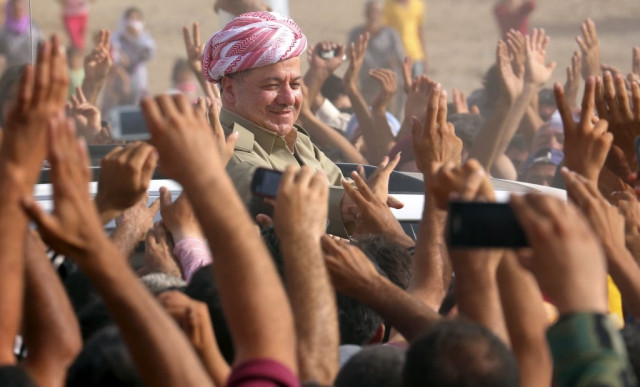More than 30,000 Syrians enter Iraq amid fighting: UN
Syrians enter Iraq, seek refuge from brutal fighting as well as a collapsing economy.

Iraqi Kurdish President Massoud Barzani (C) visits Syrian refugees at the Quru Gusik refugee camp in Arbil, about 350 km (220 miles) north of Baghdad, August 19, 2013. PHOTO: REUTERS
Humanitarian workers reported refugees fleeing from as far afield as Damascus and Aleppo, and said the massive influx had left aid agencies scrambling for critical infrastructure and supplies.
Thousands of Syrians, apparently mostly Kurds, have left their country and entered Iraq from Thursday, seeking refuge from brutal fighting between Kurdish forces and militants as well as a collapsing economy.
On Monday, an estimated 5,000 Syrians entered Iraq's autonomous Kurdistan region, the UN's refugee agency UNHCR reported.
An AFP journalist said refugees crossing were bringing with them luggage containing their clothes and personal belongings, with buses waiting on the Iraqi side of the border to ferry Syrians to camps.
"It appears we will be in the range of an estimated 5,000 people today," Peter Kessler, a spokesman for UNHCR told AFP, citing estimates by staff on the border.
"That takes the estimated number to more than 30,000" since Thursday, he said.
Kessler said while the numbers appeared to be subsiding, the UN had sent 70 trucks carrying aid for the refugees into Iraqi Kurdistan, as well as other dispatches of 2,100 tents, two prefabricated warehouses and water containers for thousands of families.
Initially, those who crossed on Thursday had been camped at the border for days and were "completely exhausted, and in the most precarious position," he said.
Kessler said the massive influx appeared to be the biggest since around 9,000 Syrians crossed into Turkey in November 2012.
"I've never seen something like Thursday, Saturday and Sunday, with the huge numbers," said Emily Dakin, Iraq country director for the International Rescue Committee.
Dakin described seeing Syrians "as far as the eye can see".
Despite efforts by aid agencies to provide critical humanitarian supplies to the refugees, however, she estimated it could take up to a month for camps to be fully equipped with adequate latrines and water provision.
"People are scrambling to put in necessary infrastructure such as latrines, make sure there is enough water, doing very basic distribution, blankets, mattresses, all that kind of thing," she said.
The sudden influx of Syrians across the border stands in marked contrast to the relatively small numbers of refugees taken in by Iraq in recent months compared with neighbouring countries.
Humanitarian workers and the Kurdish region's government appealed for international support in the wake of the influx.
"The number (of refugees) is increasing constantly," said Dindar Zebari, the deputy chief of the Iraqi Kurdish foreign affairs department.
"The international community, the UN as well as the Iraqi government should fulfil their obligations toward the refugees and provide help for them."
Syrian government forces pulled out of most Kurdish-majority areas of northern and northeastern Syria last year, leaving Kurdish groups to run their own affairs.
But al Qaeda loyalists, who have played a significant role in the rebellion against President Bashar al Assad's regime, see the region as a vital link to fellow jihadists in Iraq and have been locked in deadly fighting with Kurdish militias in recent months.
The access of Syrian refugees to Iraq has been erratic, with political tensions and fears of a spillover of the conflict leading Kurdistan regional authorities to shut the border in May.
Some restrictions were eased last month to allow Syrians to join family members already in Iraq, but the number allowed to cross the border had remained relatively low.
All told, more than 1.9 million Syrians have fled their homeland, with most seeking a haven in Lebanon, Jordan and Turkey.
Iraq hosted nearly 155,000 registered Syrian refugees, most of them Kurds, according to the United Nations, before the latest influx.



















COMMENTS
Comments are moderated and generally will be posted if they are on-topic and not abusive.
For more information, please see our Comments FAQ